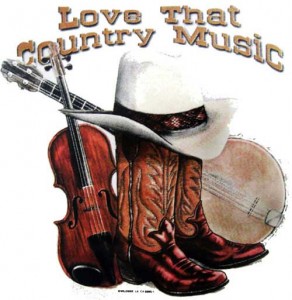By Dave Austin, the “Music Professor”
Nashville, “Music City USA,” is just a short drive up the road from where I live and work, so it goes without saying that country music is very popular at many of my events.
In fact, this fundamental American music has roots which date back to the 1920s in the rural South.
Originally called hillbilly music, the term “country music” did not come about until the 1940s when it began to encompass the equally popular western or cowboy music. Today, country is the most listened to music on radio in the United States.
At many of my weddings, couples frequently choose country songs for their first dance and those special dances with their parents because these songs often speak of love, relationships and tradition.
I’ll almost always mix in some current country pop later during the dance sets. This is music that cuts across all ages, classes and international boundaries, and in some way, influences many other musical forms.
Often thought of as music evolving from white Europeans in early America, much of its origins were contributed by African Americans.
In the rural South, blacks and whites not only worked together, but also played together and their music merged. Throughout the 19th century, immigrants from Ireland, Spain, Germany, Scotland, Italy and other countries also made their contributions to the genesis of country music.
Today, Nashville is the acknowledged center of the country music industry, but it wasn’t always so.
In the early 1920s, many Appalachian people came to Atlanta to work in the cotton mills, and of course, they brought their music with them. Among the South’s largest and most progressive cities, there was a lively music scene and a related recording industry in Atlanta.
While some recording companies turned away early hillbilly artists, others understood this music fit the tastes and lifestyles of America’s agricultural workers and rural families.
Thus, the first commercial recordings of what is considered country music were made in Atlanta – “Arkansaw Traveler” and “Turkey in the Straw” were recorded by fiddlers Henry Gilliland and A.C. “Eck” Robertson in June of 1922 by Victor Records.
Within two years, Columbia began releasing a series of “hillbilly” tunes (series 15000D, “Old Familiar Tunes”).
In 1924, Vernon Dalhart became the first country singer to have a nationwide hit with his song, “Wreck of the Old 97,” backed with “Lonesome Road Blues” which was also a hit. 1924, was a milestone year in early country music, Aunt Samantha Bumgarner and Eva Davis became the first female artists to record and release country songs.
The Great Depression of the 1930s saw a reduction in the numbers of records that could be sold, but radio broadcasting had become a popular source of entertainment.
“Barn dance” shows enjoyed a strong popularity throughout the South and quickly spread to urban centers such as Chicago and California.
The single most important of these shows was the Grand Ole Opry, broadcast by WSM in Nashville. The station’s powerful 50,000 watt signal, which could be heard across the U.S., carried the first airing the Opry in 1925, and the broadcast continues to this day.
As the 1940s came around, cowboy or western songs became popular, in great part due to Hollywood films by singing cowboys like Roy Rogers and the Sons of the Pioneers, Rex Allen and Gene Autry.
Both country and western music were frequently played together on radio stations, thus the term “country & western.” But, it wasn’t just for cowboys - the cowgirls contributed to the sound – mainly in various family groups. However, Patsy Montana truly opened the door for the ladies with her history-making song, “I Want To Be a Cowboy Sweetheart.”
It’s interesting that drums were shunned by country music as late as the 1940s, being regarded as “too loud” and “not pure.”
Early on, around 1935, western swing band leader Bob Wills added drums to his Texas Playboys. In the mid-1940, the Grand Ole Opry did not want Wills’ drummer to appear on stage and, The Louisiana Hayride show kept its drummer off stage as late as 1956. By the 1960s, it was rare that a country band did not have a drummer. Wills also was one of the first to add an electric guitar to his band.
If we follow country music’s evolutionary tree, we’ll find a large number of branches including hillbilly boogie, bluegrass, folk and gospel, honky tonk, rockabilly, country soul, the Bakersfield sound, outlaw country, truck driver country, and most recently, country pop.
Just what is it that has made country music so endearing and enduring to so many?
First, there are the recognizable lyrics and a distinctive story of loss, pain, good times or life lessons and when we hear it, we immediately recognize it from other genres of music, it speaks of traditional American values and it has something to say to Middle America.
There’s the perception that artists come from the country’s heartland and that they are perhaps a bit more honest than those from other genres of music. It also reflects a lot of cross-pollination with contemporary Christian music, both thematically and individually.
Support for the U.S. military is as characteristic as the steel guitar. Toby Keith, Montgomery Gentry, Charlie Daniels and others make it a point to entertain U.S. troops on a regular basis.
Purists argue that the music has not been country since the 1970s, but rather “countrypolitan.” True, it has continued to evolve since those earliest recordings by Vernon Gilliland and “Eck” Robertson, and no doubt, will further evolve in the future.
The fact is, if you are a DJ, you need to have a section of country music in your library because, if your gigs are anything like mine, you’ll be getting requests for Carrie Underwood, Kenny Chesney, the Zac Brown Band, and yes, even Patsy Cline.

